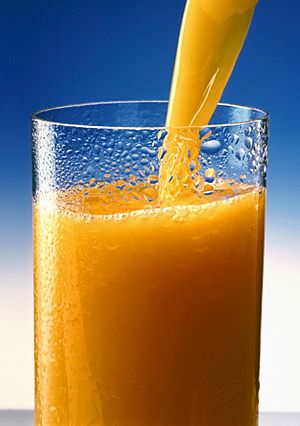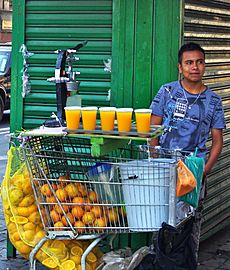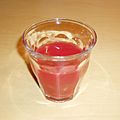Orange juice facts for kids
Orange juice is a popular drink made by squeezing oranges. It comes in different types, like regular orange juice or even juice from a special kind of orange called a blood orange. Orange juice is known for having lots of Vitamin C, which is good for your body. It also contains folic acid, which is another important nutrient.
Contents
How Orange Juice is Made for Stores
Frozen Concentrated Orange Juice
When orange juice is made for stores, it often goes through a process called pasteurization. This means it's heated quickly to kill any germs, making it safe to drink. After that, much of the water is removed using heat and a vacuum. This creates a thick, syrupy "concentrate."
This concentrate is then stored in very cold places. Later, things like natural flavors, extra Vitamin C, and oils from the oranges might be added back. This helps the juice taste fresh and have all its nutrients. When you buy frozen concentrate, you add water to it at home to make it into juice again. This is called "reconstituting" it.
This way of making orange juice was invented in 1948. For many years, frozen concentrated orange juice was the most popular type. However, other kinds of orange juice have become more popular since the 1980s.
Not From Concentrate Orange Juice
"Not from concentrate" orange juice is also pasteurized, but it isn't turned into a thick syrup. Instead, it's sold directly to you after being pasteurized.
Even though it's "not from concentrate," this type of juice still goes through a special process. To store it for a long time (sometimes up to a year!), the oxygen is removed from the juice. This keeps it fresh, but it also takes away some of the natural orange flavor.
Because of this, companies often add back "flavor packs" to the juice. These packs contain special ingredients that bring back the taste of fresh oranges. The flavors can be different depending on where the juice is sold, because people in different places like different levels of sweetness or tartness. The ingredients in these flavor packs don't always have to be listed on the juice carton.
One common ingredient in these flavor packs is something called ethyl butyrate. This is a natural smell found in fresh oranges that makes them smell "fresh." When juice is processed, some of this natural smell is lost, so it's added back in.
Canned Orange Juice
A small amount of orange juice is sold in cans. Canned orange juice is good at keeping its vitamin C for a long time. However, if it's kept at room temperature for too long (more than about three months), it can start to lose its flavor.
Years ago, canned orange juice sometimes tasted metallic because of how acidic the juice was. But in 1931, a scientist named Dr. Philip Phillips found a way to heat the juice very quickly, which solved this problem. This made canned orange juice much more popular.
Freshly Squeezed Orange Juice
The closest you can get to eating an orange is drinking freshly squeezed, unpasteurized orange juice. This juice is simply made by squeezing oranges and putting the juice into bottles. It doesn't go through any heating (pasteurization) or have anything added to it.
Because it's so fresh, this type of orange juice doesn't last as long as other kinds. It usually stays fresh for about 5 to 23 days, depending on how cold it's kept.
Popular Orange Juice Brands
In the United States, a very well-known orange juice brand is Tropicana Products. It sells a lot of orange juice, not just in the U.S. but also in other parts of the world like Europe.
Other big brands include Minute Maid and Florida's Natural Growers. Florida's Natural is special because it's owned by orange growers in Florida and only uses oranges grown there. Some other brands use oranges from different places.
In Australia, Daily Juice is a popular brand. In the United Kingdom, you might find brands like Del Monte and Princes.
Images for kids
-
A glass of blood orange juice
See also
 In Spanish: Jugo de naranja para niños
In Spanish: Jugo de naranja para niños
 | Lonnie Johnson |
 | Granville Woods |
 | Lewis Howard Latimer |
 | James West |






